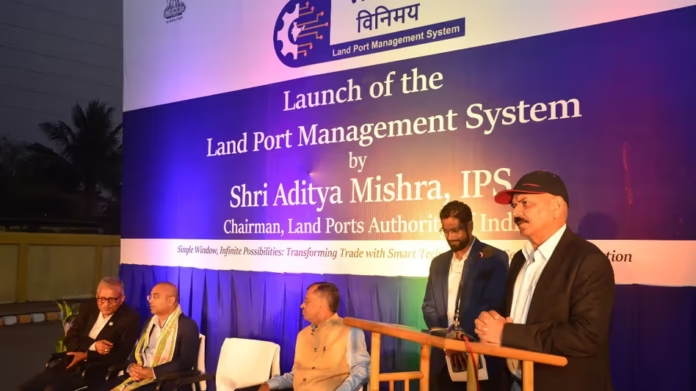The Land Port Authority of India (LPAI) is gearing up to revolutionize cross-border transit by introducing digital solutions across its 15 land ports. Chairman Aditya Mishra announced that platforms like Digi Yatra and Yatri Suvidha Portals would soon streamline passenger and cargo movement, enhancing convenience and efficiency for travelers and businesses alike.
Mishra highlighted the importance of integrating technology into land port operations, emphasizing that the initiative aims to align with India’s digital transformation agenda. These advancements will not only simplify processes but also significantly reduce delays caused by manual checks and documentation. Passengers and traders will benefit from faster transit times, boosting economic activity and cross-border trade.
The proposed integration includes the use of advanced identification systems and real-time tracking. This will help passengers and cargo operators plan their transit more effectively. Mishra explained that digitization would minimize paperwork and improve overall operational transparency. By adopting these measures, India aims to enhance the global competitiveness of its border infrastructure.
In addition to the operational benefits, the move is expected to strengthen border security. The adoption of digital platforms will enable real-time monitoring and verification, reducing the risk of illegal activities. Mishra stated that this balance between seamless transit and robust security is crucial for the nation’s land ports, which serve as gateways to trade and travel with neighboring countries.
The LPAI Chairman pointed out that the digital transition is particularly vital for land ports connecting India with countries like Bangladesh, Nepal, and Bhutan. These ports handle substantial volumes of goods and passengers daily. Modernizing these entry points will create a ripple effect on regional trade, promoting economic integration within South Asia. Enhanced port efficiency is expected to reduce logistics costs, providing a competitive edge for Indian exporters and importers.
Aditya Mishra also underlined the need for extensive training and capacity building for staff operating at the ports. He stated that the LPAI is investing in workforce development to ensure smooth adoption of the new systems. Training programs will familiarize personnel with the technologies, ensuring they can efficiently manage the transition and assist passengers and traders in adapting to the changes.
The government’s commitment to sustainable development was also evident in Mishra’s statements. He shared plans to incorporate green technologies alongside digital ones, making the ports more environmentally friendly. The modernization drive includes energy-efficient buildings, solar panels, and other sustainable practices that align with India’s broader climate goals.
Stakeholders from various industries have welcomed the announcement, expressing optimism about the potential impact of these changes. Trade organizations see this as a step towards reducing inefficiencies that have long plagued cross-border trade. Passenger groups, too, are hopeful about smoother and faster travel experiences.
The upcoming integration marks a significant milestone in the evolution of India’s border infrastructure. It signals a commitment to innovation and modernization, ensuring that India remains at the forefront of regional connectivity. The LPAI’s efforts also align with the government’s vision of a Digital India, emphasizing the use of technology to improve governance and public services.
Aditya Mishra’s announcement highlights the government’s proactive approach to addressing longstanding challenges in border management. By embracing digital solutions, the LPAI aims to create a more accessible and secure experience for everyone using India’s land ports. This initiative not only promises to transform the way ports function but also underscores India’s role as a leader in fostering regional cooperation and connectivity.
As the LPAI prepares to implement these changes, the focus remains on creating a system that balances efficiency with security. The use of platforms like Digi Yatra and Yatri Suvidha Portals is set to make cross-border transit a hassle-free experience, benefiting millions of passengers and traders annually. With these digital advancements, India’s land ports are poised to become benchmarks of modernization and efficiency in the region.


